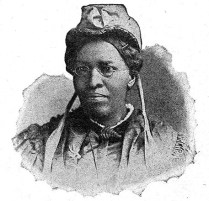Editor's note: Today's post continues our Women's History Month series, connecting our contemporary efforts for justice with the evangelical women who came before us. We will feature "women of character, courage, and commitment" each Wednesday in March.
My pastor once said that God often calls us in our area of weakness, asking us to do the things we most fear.
I didn't want to believe that. Just days before, I was invited to speak at a conference. While I was flattered, I fretted about my decision for months since I was not comfortable with public speaking. Why would God ask me to do something that so clearly frightened me?
That is the same question that plagued the heart of Amanda Berry Smith.
Amanda was born into slavery in 1837. Married at 17, she all-too-quickly became a widow at age 26. She labored as domestic help for minimal wages, raising her children alone. She was so poor she couldn't afford medicine to heal her sick baby. Weeping bitterly when he died in her arms, she realized she had no money to bury him.

Despite personal hardship, Amanda was a resolute believer. She felt that even while doing menial tasks like mending clothes or washing dishes, she was serving God. In her autobiography, she wrote,
I found out that it was not necessary to be a nun or be isolated away off in some deep retirement to have communion with Jesus; but, though your hands are employed in doing your daily business; it is no bar to the soul's communion with Jesus. Many times over my wash-tub and ironing table, and while making my bed and sweeping my house and washing my dishes I have had some of the richest blessings.
Amanda showed deep devotion to God. Yet, she felt like many of us do, fearful and unqualified, when he called her to carry his message around the world.
In the 1870s, the equal participation of a black woman in church or public life was unusual–even in areas where they were considered "free." Despite the fact that she had left slavery many years before, Amanda still faced discrimination.
In Philadelphia, Amanda wanted to attend a Bible reading held by author and speaker Hannah Whitall Smith. On her way, she happened to sit by Hannah's husband, Robert. He did not show any embarrassment at being seen in her company. "How real and kind and true he was," said Amanda.
However, when she arrived at the prestigious address, she grew nervous. Amanda prayed to God to give her the courage to attend the white gathering. "I always tried to avoid anything like pushing myself or going where I was not wanted," she explained. When she arrived, a woman told her the meeting was full and to come back another time. She slipped quietly inside and stood at the back.
Immediately following the meeting, a finely dressed woman approached her. "Are you Amanda Smith!? Why didn't you sing for us? Why didn't you speak?" Amanda felt convicted by her lack of confidence. She said, "I was not so well known then and many people were shy of me, and are yet. But, I belong to Royalty and am well acquainted with the King of Kings and am better known and better understood among the great family above than I am on earth."
How true that is of us today. While our insecurities may not be couched in the color of our skin, we often hold back from participating because of our lack of experience or even, sometimes, our gender. Yet, Amanda demonstrated what it means to quietly and determinedly step in and take our place, even when we are marked by insecurity.
While some did not want her at those meetings, others welcomed her and were surprised at her reticence. They encouraged her to stand, to speak, even ushered her to the front of the room. We are royalty, declared Amanda, children of the King. We have been given great gifts, and, in our relationship with God, we find self-assuredness and confidence that has nothing to do with our outward appearance, our gender, the color of our skin, or even our self-determination.
Amanda was convicted that God was on her side and that He would enable her to face her fears. Several women invited Amanda travel to England to hear evangelist D.L. Moody preach. Again, both fear and excitement battled as she had never left the United States. Should she go?
Deciding the adventure was worth the risk, she packed her trunk and boarded the steamer for England. She was the only African American woman on the ship. The captain said since there was no preacher aboard, maybe she could read from the gospel of John and lead them in a hymn. Suddenly, the atmosphere changed, and the people she once feared became friends.
In England, she was asked to sing and speak. She was a novelty as a black woman and former slave. As many as 600 people at a time would attend those meetings. In 1879, she received another invitation to travel to India. With each step, she felt God's leading and reassurance.
In October, she sailed to Bombay where Amanda would travel and speak. One pastor spoke of her ministry in Calcutta. In the past few nights, Christian preachers had been treated roughly, but Amanda was not afraid. The Bishop, standing to her side, noticed a group of men and boys gathering, moving toward the square with loud cries and threats.
He wrote of the occurrence, "Sister Smith knelt on the grass and began to pray. She turned her face – smiling – to the sky and poured out her soul. The crowd became very still – transfixed by her appearance – and did not even whisper. It was as if they were in the midst of a church."
Here was a woman who experienced the oppression of slavery and poverty, yet, in following God and turning her face to the sky, she displayed incredible confidence and power. People could sense that in her. When Amanda prayed, crowds grew silent. Oh to pray and speak like Amanda Berry Smith!
She would soon travel to the continent she had only dreamed about: Africa. In Africa, the educational, spiritual and physical needs overwhelmed her. She went from place to place by canoe, visiting schools and mission stations. She was upset by the conditions facing African women who would marry at age 13 or 14, sometimes younger. She saw infants just a few months old wearing betrothal jewels. Some missionaries would "buy" a girl and pay her dowry for $20 to $25 just to save her from a miserable life. Amanda wrote, "When I first went to Africa, I saw there was much to do, and I felt I could do little."
In 1890 Amanda journeyed home to the United States. It had been years since she left and her health was suffering. 'I was so tired of holding on and trying to keep up… I went to Africa at [God's] bidding, and did not leave until I was sure I had his sanction."
God used Amanda Berry Smith in mighty ways. After returning home, she joined the Women's Temperance Movement in Chicago. She wrote her autobiography and started an orphanage for African American girls. When she died in 1915, her funeral was one of the most widely attended by African Americans who gathered to honor this resilient woman of faith.
There are many women whose stories are not told, women like Amanda Berry Smith who refused to give in to fear, obeying God's call and venturing into unknown places to serve Him. Let's share their stories. We can gain confidence by learning from the examples of others.
By the way, I said "yes" to that speaking invitation. My daughter noted that I trembled a bit, my foot wiggling back and forth as I spoke. But, like Amanda, God gave me the courage and confidence I needed to follow, even in my weakness. I just had to take that first terrifying step.
Oh that we can all be a bit more like Amanda Berry Smith. Walking in the door. Getting on the ship. Going where God calls us.
Jamie Janosz is a wife, mother, professor and writer. She works at Moody Bible Institute in Chicago, but in her spare time you'll find her poking through antique shops. Most recently she authored When Others Shuddered: Eight Women Who Refused to Give Up which tells the stories of eight significant women of faith, including Amanda Berry Smith. Her blog is www.jamiejanosz.blogspot.com.










